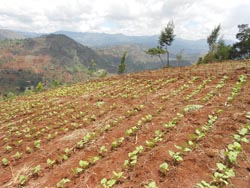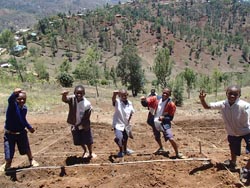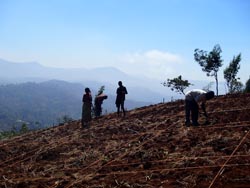|
Jori Langwerden and Elise Bressers, two MSc students from Amsterdam and Wageningen, are currently working in the Usambara Mountains, northern Tanzania. The Usambara Mountains are an important bean growing area because of its favourable climatic conditions and natural resources. However, many of the production areas are located on steep slopes which are intensively cultivated and highly degraded over the last couple of years. Jori and Elise have set up several experimental field trials within the area of Lushoto district to study the soil and plant nutrient deficiencies of common bean, and how the production can be improved with use of Rhizobium inoculation and fertilizers (especially P and K). |
Planting of a commen bean trial at 1423m above sea level in the Usambara Mountains |
Over the last month they have selected and planted eleven trials on farmer’s fields. Even though the fields are within a small area, they found that there is a lot of diversity in soil types, rainfall patterns and land use. They especially enjoyed the collaboration with the local farmers during planting, and at one location the assistance of the local primary school students. Although the rainy season was a bit delayed this year, their beans are growing well and the first treatment differences are already becoming visible at some locations. The coming period they will be busy managing the field trials and carrying out lab analyses at NM-AIST in Arusha.

Fields that germinated very well and homogeneously |

Planting beans at a primary school in Kikurunge, Usambara Mountains |
|
Treatment differences after 4 weeks at Jeagenstal, Usambara Mountains |
You may already have seen a first update on the activities of Jori and Elise on N2Africa Facebook and we hope that during their research they will share more of their experiences with us this way.
Jori Langwerden Elise Bressers and Charlotte Schilt


